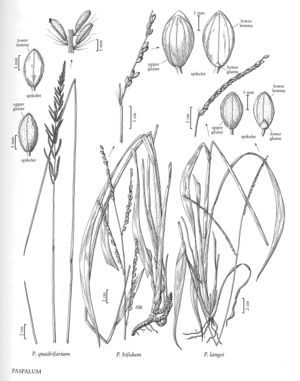Difference between revisions of "Paspalum bifidum"
FNA>Volume Importer |
imported>Volume Importer |
||
| (4 intermediate revisions by 2 users not shown) | |||
| Line 4: | Line 4: | ||
|publications= | |publications= | ||
|common_names=Pitchfork paspalum | |common_names=Pitchfork paspalum | ||
| + | |special_status={{Treatment/ID/Special_status | ||
| + | |code=E | ||
| + | |label=Endemic | ||
| + | }} | ||
|basionyms= | |basionyms= | ||
|synonyms= | |synonyms= | ||
| Line 17: | Line 21: | ||
-->{{Treatment/Body | -->{{Treatment/Body | ||
|distribution=Va.;Okla.;Miss.;Tex.;La.;Mo.;Ala.;Tenn.;N.C.;S.C.;Ark.;Ga.;Fla. | |distribution=Va.;Okla.;Miss.;Tex.;La.;Mo.;Ala.;Tenn.;N.C.;S.C.;Ark.;Ga.;Fla. | ||
| − | |discussion=<p>Paspalum bifidum is restricted to the southeastern United States. It grows at the edges of forests in longleaf pine-oak-grass ecosystems, usually in dry to mesic loamy sandy soils. It grows vigorously following fire.</p> | + | |discussion=<p><i>Paspalum bifidum</i> is restricted to the southeastern United States. It grows at the edges of forests in longleaf pine-oak-grass ecosystems, usually in dry to mesic loamy sandy soils. It grows vigorously following fire.</p> |
|tables= | |tables= | ||
|references= | |references= | ||
| Line 26: | Line 30: | ||
-->{{#Taxon: | -->{{#Taxon: | ||
name=Paspalum bifidum | name=Paspalum bifidum | ||
| − | |||
|authority=(Bertol.) Nash | |authority=(Bertol.) Nash | ||
|rank=species | |rank=species | ||
| Line 33: | Line 36: | ||
|basionyms= | |basionyms= | ||
|family=Poaceae | |family=Poaceae | ||
| − | |illustrator=Linda A. Vorobik | + | |illustrator=Linda A. Vorobik;Cindy Roché |
| + | |illustration copyright=Utah State University | ||
|distribution=Va.;Okla.;Miss.;Tex.;La.;Mo.;Ala.;Tenn.;N.C.;S.C.;Ark.;Ga.;Fla. | |distribution=Va.;Okla.;Miss.;Tex.;La.;Mo.;Ala.;Tenn.;N.C.;S.C.;Ark.;Ga.;Fla. | ||
|reference=None | |reference=None | ||
|publication title= | |publication title= | ||
|publication year= | |publication year= | ||
| − | |special status= | + | |special status=Endemic |
| − | |source xml=https:// | + | |source xml=https://bitbucket.org/aafc-mbb/fna-data-curation/src/200273ad09963decb8fc72550212de541d86569d/coarse_grained_fna_xml/V25/V25_1472.xml |
|subfamily=Poaceae subfam. Panicoideae | |subfamily=Poaceae subfam. Panicoideae | ||
|tribe=Poaceae tribe Paniceae | |tribe=Poaceae tribe Paniceae | ||
Latest revision as of 17:57, 11 May 2021
Plants perennial; rhizomatous. Culms 60-140 cm, erect; nodes glabrous. Sheaths pubescent; ligules 2-4 mm; blades to 37 cm long, 2.2-11 mm wide, flat. Panicles terminal, with 2-5 racemosely arranged branches; branches 3.7-13 cm, divergent to erect; branch axes 0.2-0.8 mm wide, glabrous, margins scabrous, terminating in a spikelet. Spikelets 3.1-4 mm long, 2-2.5 mm wide, paired, not imbricate, appressed to the branch axes, elliptic to obovate, yellow-brown. Lower glumes present or absent; upper glumes glabrous or sparsely pubescent basally, (6)7-veined, margins entire; lower lemmas glabrous or sparsely pubescent basally, lacking ribs over the veins, 5-veined, margins entire; upper florets white. Caryopses 2.6-2.9 mm, purple. 2n = unknown.
Distribution
Va., Okla., Miss., Tex., La., Mo., Ala., Tenn., N.C., S.C., Ark., Ga., Fla.
Discussion
Paspalum bifidum is restricted to the southeastern United States. It grows at the edges of forests in longleaf pine-oak-grass ecosystems, usually in dry to mesic loamy sandy soils. It grows vigorously following fire.
Selected References
None.
